Bill McKibben on the Divestment Movement
Air Date: Week of June 26, 2020
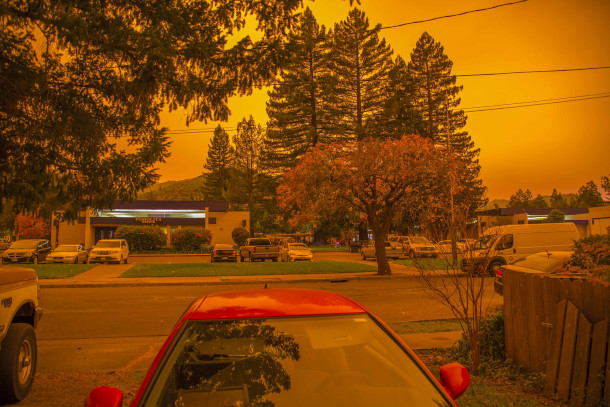
Smoke from the Camp wildfire in Ukiah, California. (Photo: Bob Dass, Flickr, CC BY 2.0)
Harvard is one of the latest in a series of wealthy institutions around the world announcing steps towards pulling their investments in the fossil fuel industry. But Harvard’s announcement has been called too little, too late. Bill McKibben, author of “The End of Nature” and cofounder of 350.org, joins Host Steve Curwood to discuss Harvard’s announcement, and what the divestment movement has achieved so far. Also, why racial justice goes hand in hand with the fight for a cleaner environment, and the big takeaways that the coronavirus pandemic has for the climate crisis.
Transcript
CURWOOD: When the establishment is slow to move on a social issue of fairness, campaigners sometimes advocate for the divestment of holdings in companies that they perceive as part of the problem. For years campaigners opposed to the apartheid regime of South Africa urged university and foundation endowments and other institutional investors to sell their stock in companies that did business with the white supremacist regime. And just as the pressure from the anti-apartheid divestment movement helped efforts to desegregate South Africa, nearly a decade of calls for the divestment of fossil fuel stocks to help address climate disruption seems to be having an effect as well. Many pension funds as well as university and college endowments have signed on. Some universities including Cornell and Georgetown have committed to full divestment within the next ten years, while others including Brown and the University of California system, have already pulled nearly all of their investments from fossil fuels. Now, Harvard University says it will take steps to join the divestment movement and be carbon neutral by 2050 as UN scientists have urged but critics say if Harvard waits until then to reduce its fossil fuel investments it’ll be far too late for the climate. Writer Bill McKibben is the award-winning author of the End of Nature and a co-founder of 350.org, and perhaps the most prominent leader in the fossil fuel divestment movement and he joins me now. Bill, welcome back to Living on Earth!
MCKIBBEN: Hello, Steve,
CURWOOD: Boy, how many years ago you wrote The End of Nature, 1989?
MCKIBBEN: That would be 31 years ago, Steve.
CURWOOD: Congratulations! And then fast forward to the moment where you start 350.org with some students from Middlebury College. How did this all come together?
MCKIBBEN: Well, you know, I spent those years after writing The End of Nature, writing more books and talking all the time about climate, thinking that we were engaged in an argument. It took me way too long to figure out that, really, we'd won the argument. We were just losing the fight because the fight wasn't about data and reason, it was what fights are always about: money and power. And once I figured that out, we were going to have to take on the fossil fuel industry. We started trying to build movements because, you know, historically, that's the only way to stand up to money and power on that scale. That 350 is was the kind of first iteration of the global climate movement. And now thank god we've got Extinction Rebellion and Sunrise Movement and climate striking kids all over the world and on and on and on.
CURWOOD: How do you feel about all that Bill?
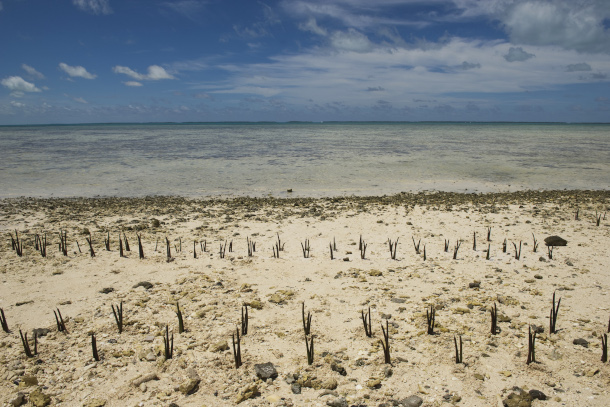
Mangrove shoots planted on an atoll in Kiribati as part of a UN campaign to raise awareness about the effects of climate change on the land. (Photo: United Nations Photo, Flickr, CC BY-NC-ND 2.0)
MCKIBBEN: When I need to make myself feel optimistic about the world, that's what makes me feel optimistic. Of course, it's all taken a long time to get going. And in the process, the planet is heated up a lot. And we've begun to see real trauma. What were warnings 31 years ago and The End of Nature are now kind of bulletins from the front line as we watch Australia half burned to the ground or storms like we've never seen before crash into our coasts. So I don't know whether we got started in time or not, but I know that there's now a really powerful fight underway and we're taking some bites out of the fossil fuel industry.
CURWOOD: So let's go back to what, 2012 is when 350.org really launches Go Fossil Free?
MCKIBBEN: Yeah, I mean, at the time when it started, it was very small affair. I mean, I can remember the day that the very first institution, a college in rural Maine called Unity College with an endowment of $8 million announced that it was divesting from fossil fuel and we were over the moon. We didn't know that it would grow into $14 trillion worth of endowments and portfolios that have divested in part or in whole, or that it would reach the point where as that stock guy, Jim Cramer said on TV in January, no one should invest in Big Oil anymore. Divestment campaigns just gotten too big. You can't make money anymore out of oil.
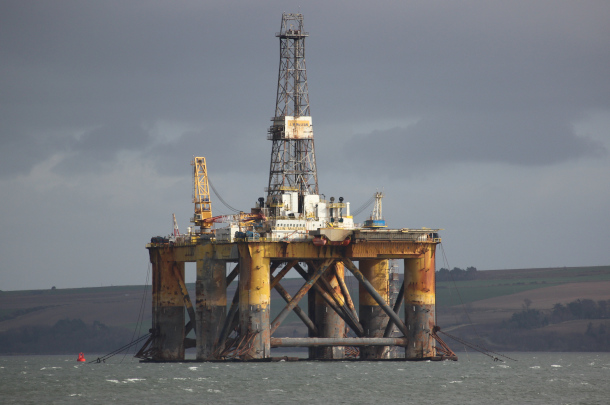
An oil rig off the coast of Scotland. (Steven Straiton, Flickr, CC BY 2.0)
CURWOOD: Should I say congratulations?
MCKIBBEN: Well, I gotta say, that made me happy to hear. Because really, it's been the political power of the fossil fuel industry that's kept us locked into our current status quo. Their business model literally depends on us not taking climate change seriously. And for years, really, for decades, they got away with it. They knew everything there was to know about climate change back in the 1980s and just straight up lied about it. That disinformation campaign has cost us what may turn out to be the crucial 30 years, but at least now, people are managing to fight back.
CURWOOD: So what do you think enabled the fossil fuel divestment movement to grow despite the uphill battle that it's faced?
MCKIBBEN: Well, I think there were a couple of things. One was that the kind of math around this became very clear. The divestment movement launched with an analysis, some data showing that the fossil fuel industry had five times as much carbon in its reserves as any scientists thought we could safely burn. And once we had that data in hand, really everybody could see that if the fossil fuel industry's business plan carried out as they wanted it to, there was no drama, no mystery to this story, the final chapter was writ. I think the other thing though, and maybe most important, was that it let everybody get in the fight. Now, most people don't have a pipeline going through their backyard and they don't live next to a coal mine. But everybody is in proximity to a pile of money someplace, a university endowment to city pension fund, a church retirement fund, and those were precisely where people mobilized. You know, as I say, it started one small college in Maine, but by last year, we were, you know, the University of California system divesting 126 billion dollar-pension and endowment fund or the Republic of Ireland divesting all its public accounts or the city of New York divesting its $200 billion pension fund. So not only has it been a question of money, it's also been a question of many of the most important institutions on earth being forced by activists to break ties with this industry, to say we no longer want to participate with an industry that's wrecking the planet.

‘350’ stands for 350ppm of carbon dioxide, the safe upper limit to avoid a climate tipping point. (Photo: Shubert Ciencia, Flickr, CC BY 2.0)
CURWOOD: Of course, one of those activists is Bill McKibben, you. And as I recall, it's about 2012 you start this tour of college campuses that you labeled do the math. But in fact, who really led this movement of fossil fuel divestment?
MCKIBBEN: Well, an awful lot of it was young people. That's who's been at the forefront of the climate movement all along. And there they were in college, a lot of them working hard on fossil fuel divestment. And really, Steve, one of the best outcomes of this whole thing is that those exact same people when they graduated from college and wanted to keep working, went on to found the sunrise movement, and they're the ones who brought us the Green New Deal. So for instance, Varshini Prakash, who is the executive director of the Sunrise Movement, and really the lead spokesman, I think for the Green New Deal, she was the same young woman who divested University of Massachusetts during her undergraduate years. So one of its many uses was as a terrific training ground for some of the best activists in the country.
CURWOOD: Now, Bill, tell us what exactly does divestment look like? What exactly does a university or a pension fund or a foundation need to do to cleanse itself from investments in the fossil fuel industry?
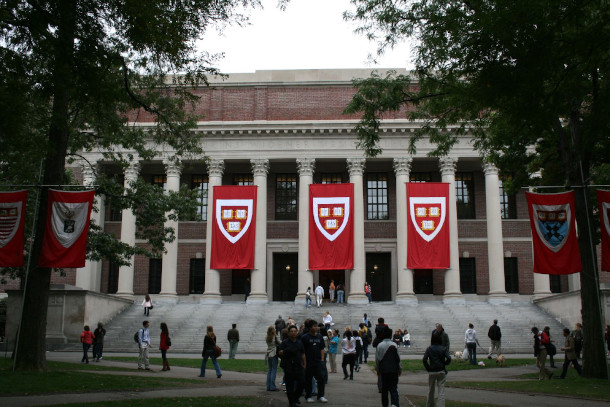
The Widener Library at Harvard University. (Photo: Joseph Williams, Wikipedia CC BY 2.0)
MCKIBBEN: Well, you know, at first it was a little bit hard for places to do it because investment advisors and tanks didn't know how to do it. They said, oh, it's impossible. We're all our funds are mingled, you're in index funds, it's so hard to get out. But relatively quickly, all kinds of funds sprung up that made it easy for people to get out of fossil fuel. So really, I mean, all it takes is your investment advisors making a committed decision to sell those stocks over the course of a few years. And one of the things that made it much easier was that, pretty soon, there was not only a strong moral case, there was also a strong financial case. The institutions that divested from fossil fuel really did well financially, because the fossil fuel industry has been the worst performing part of our economy. And for good reason. I mean, A, their product is destroying the planet. So that attracts regulatory pressure and, B, the sun and win, people have figured out how to provide the same service, energy, just cleaner and cheaper. So it's a terrible business to be in. Even if you didn't care about destroying the planet, you'd want to get out of it because it just loses money.
CURWOOD: So how has the divestment movement played out for the fossil fuel industry?
MCKIBBEN: Well, they've hated it from the beginning. And it turns out, it wasn't just what we kind of thought at the start that we were taking away their social license. That's been very effective. There's nothing that's been more effective in spreading the news that their business model equals disaster for the Earth. But it has reached a size and scale where it's begun to cause them real financial problems. I told you before that Jim Cramer had said on his, you know, stock picking program, that this was the reason that big oil was no longer a good investment. Shell said in their annual report last year, that it did become a material risk to their business, which is good since Shell's business is a material risk to the planet. I mean, when the coal industry went begging to Congress for a bailout at the beginning of the COVID crisis, they listed divestment as one of the reasons they couldn't raise money on their own.
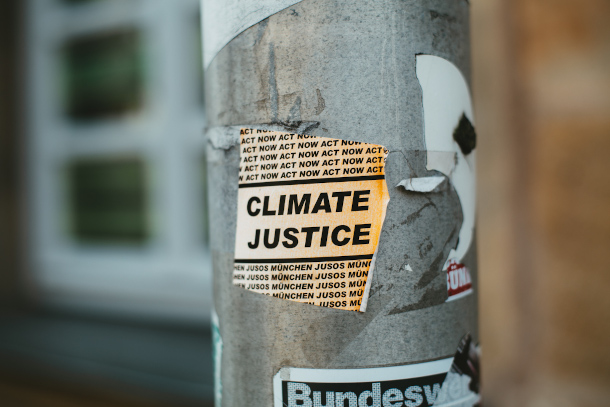
A sticker as part of a campaign for action on climate justice. (Photo: Markus Spiske, Flickr, CC BY 2.0)
CURWOOD: How interesting did you find it during these discussions in universities that that economic argument that these endowments were at risk because of what was happening with fossil fuels for many years seem to fall on deaf ears?
MCKIBBEN: Well, here's the interesting thing about universities in particular. You know, their boards of trustees, I think if you go back 40 or 50 years, they were mostly made up of kind of eminent people with the occasional rich guy there, you know, in order to write some checks. But now they're mostly made up of just rich people. And if you look at where the money is in our strange twisted economy, that mostly means people out of Wall Street. So it was hard for them to deal with the fact that people were calling to account the notion that investment could be a real force for evil on this planet. And it took them a while to wrap their heads around that, in fact, it took their students shouting at them over and over and over again before it finally began to get through. And it hasn't gotten through everywhere. I mean, there are universities and Harvard's probably the best example that just obstinately refused to do this. I think basically, because they're worried that some ancient old alum sitting in his overstuffed leather chair is going to read a nasty article about it. In the Wall Street Journal and, you know, give one less squash court in his will or something.
CURWOOD: Why is Harvard's recent carbon neutrality by 2050 announcement controversy for for many activists? And how do you personally feel about their decision? And of course, I should mention that in full disclosure, it's kind of personal for both of us as we spent our undergrad years there.
MCKIBBEN: I don't think that Harvard's announcement's controversial for activists, I don't know anybody who's anything but disgusted by it. I mean, look, Harvard has long since forfeited the idea that they're going to be a leader on any of this stuff. And now they're not even willing to be a follower. Announcing that you're going to do something in 2050 at this point, Steve, you know, the science of all of this well enough to know that's not very helpful. The game will be decided long before then we need people stepping up and acting now. And I gotta say Harvard has been a tremendous disappointment, but whatever. The rest of the world is going on around them. The other Ivy's are, many of them, busily divesting the biggest universities on the planet are divesting like the UC system. And the same day that Harvard made its announcement that it was going to wait till 2050, the only institution with more prestige and status, Oxford, said we're all in with fossil fuel divestment. So I'll take that.
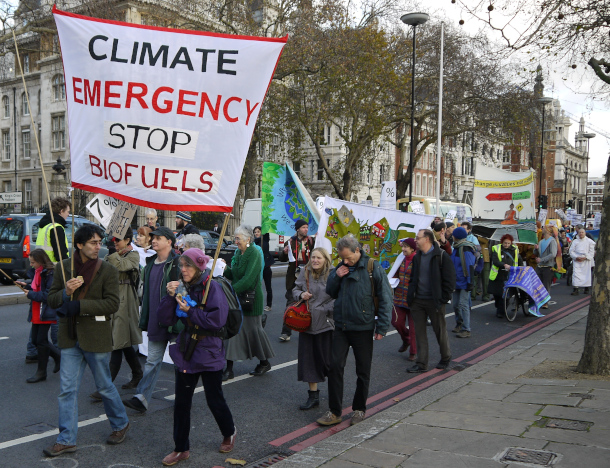
A climate justice march. (Photo: Global Justice Now, Flickr, CC BY 2.0)
CURWOOD: My guest is Bill McKibben and we’ll have more of our conversation just ahead on Living on Earth.
ANNOUNCER: Funding for Living on Earth comes from you, our listeners, and United Technologies, combining passion for science with engineering to create solutions designed for sustainability in aerospace, building industries, and food refrigeration.
[CUTAWAY MUSIC: Haugaard & Hoirup, “Huset ved havet/Vals fra Agerkrog” on “Rejsedage (Traveling),” GO'Danish Folk Music]
CURWOOD: It’s Living on Earth, I’m Steve Curwood.
And I’m back now with writer, climate activist, and co-founder of 350 dot org, Bill McKibben.
So what are the rationales that universities have given for their decisions once they do decide to divest from fossil fuels?
MCKIBBEN: Well, once they make the decision, they've been able to join with students and saying, we very much want to take a stand about climate change. I mean, we're in the business of preparing students for the future. That's a wonderful business to be in. But that implies not only that you prepare the students well, but that there's a future for them to exist in. And it doesn't make sense to be training people to go off and do a thousand interesting, wonderful careers, and at the same time, building a world where all those students are going to be doing in 40 years is some kind of, you know, emergency response because that's all we're going to be doing as a society. So I think it's really liberating for institutions to say, you know what, we're on the same side, as our students on this. And we've understood that they have moral authority here, because they're going to be dealing with this long after we trustees are in the grave.
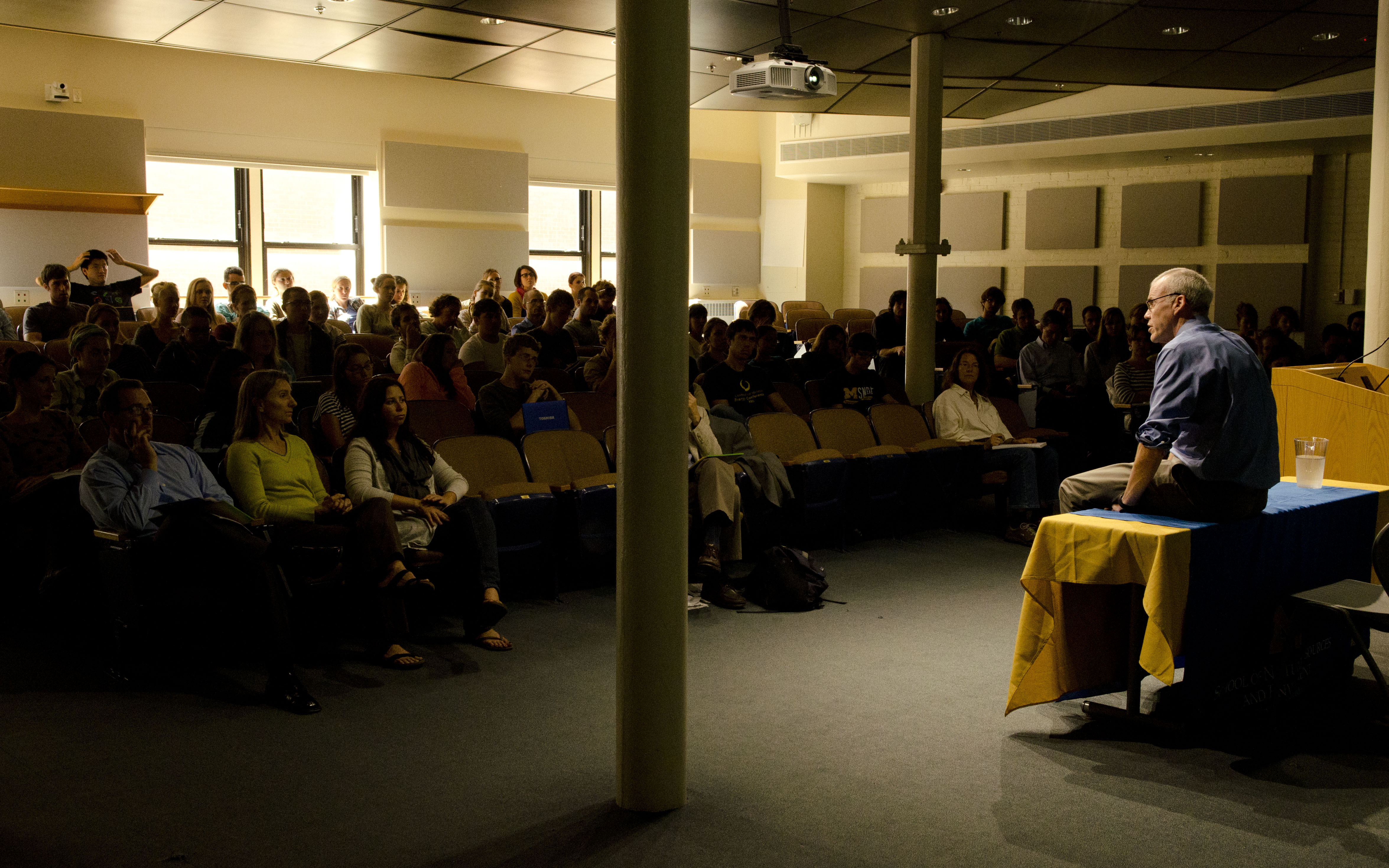
Bill McKibben giving a speech at the School for Environment and Sustainability at the University of Michigan. (Photo: Dave Brenner, SNRE, Flickr, CC BY 2.0)
CURWOOD: Let's just go back to Harvard for a moment on that point. Not only students, but faculty at Harvard, say, looking at sea level rise, some of the Harvard campus could be underwater, not so long from now.
MCKIBBEN: Yep. And this is one of the things of course, that makes it so galling that these institutions, some of them continue to invest in fossil fuel. It's in the research labs of these universities that we found out about climate change. That's how we know what's going on. And so it's just crazy making that they refuse to take that seriously.
CURWOOD: So what's next for the fossil fuel divestment movement? Do you think?
MCKIBBEN: Well, what's happening is that not only is it continuing to grow in this sort of selling stock from the fossil fuel industry, but it's kind of morphed in the last year or two into a big assault on the financial institutions--banks, asset managers, insurance companies that are their financial lifeline. We're calling this Stop the Money Pipeline. That's a big coalition of environmental groups from the Sierra Club and 350 to you know, many, many, many groups. A lot of this work pioneered by indigenous groups, especially in the wake of the Dakota Access Pipeline fight. And you know, it's still early days in a way, but it's been successful much more rapidly even than the divestment work, because it builds on it. You know, in the course of the winter, BlackRock, the biggest asset manager on Earth, really the biggest box of money on planet Earth, their CEO, after a big pressure campaign, came out and said, this is going to be the issue that drives all our financial thinking going forward. And indeed, in this spring's shareholder season, BlackRock at least began to take some votes to force companies of which they own large percentages to start wising up about climate. So this is the next part of that work.
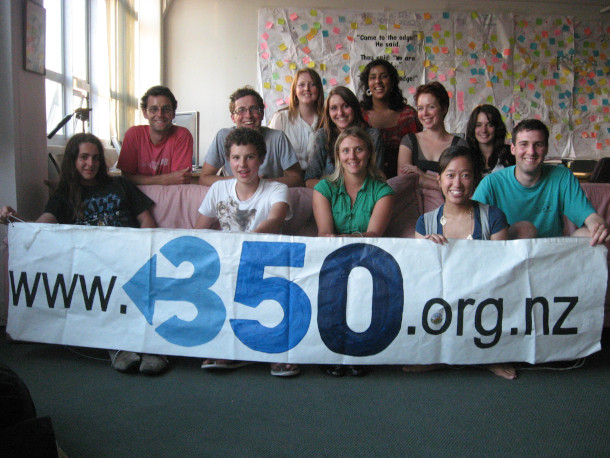
Activists hold a banner for 350.org. (Photo: 350 Aotearoa, Flickr, CC BY 2.0)
CURWOOD: What kind of criticism have you endured over the years for your climate activism?
MCKIBBEN: Oh, just as one would expect when one's taking on the most powerful forces in the world, that they're not going to like it. So there have been plenty of people who've gone after me in one way or another. But those kind of things come and go. What endures is the incredibly stark fight that we're in. What endures is the constantly rising level of CO2 in the atmosphere. And thank God, the constantly rising level of activism designed to turn that around. It's become, by some measures, maybe the most widespread fight around the world. And I think we're reaching a turning point. I think that the political power of the fossil fuel industry has begun to wane after a century or two of waxing. And our job is to accelerate that to push hard for really rapid, rapid change.
CURWOOD: Bill, you know back even in 2016, you were closely involved with Bernie Sanders' campaign for president. With your wisdom and perspective, looking ahead at this electoral season, what do you see? What should be done?
MCKIBBEN: I don't think there's ever been a clearer election than we've ever faced now. And that's not because, you know, Joe Biden is the single greatest champion of all good things that there ever was. He's not, but it's because it should be clear to any thinking human being that we simply cannot stand another four years of Donald Trump, not on a thousand different counts, but climate's one of the most obvious. I mean, look, this guy pulled the country that put more carbon into the atmosphere than any other out of the only international effort, the Paris Climate Accords, to do anything about it. He's done a lot of shameful things in his presidency, but that's pretty near the top of the list. So I can't imagine how important it is that we get things done between now and November. And then after November 3, I mean, the good thing about electing half-decent people to run things is then you can go and put pressure on them to do the right thing. I mean, that's what we did with Barack Obama around the Keystone pipeline. It doesn't do any good to go try and pressure Donald Trump. What does he care?
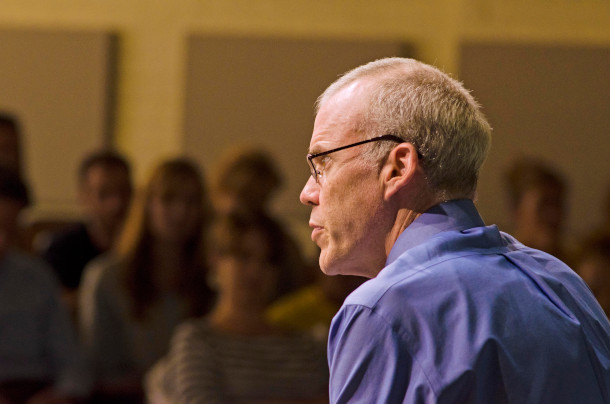
Bill McKibben is an American environmentalist, author, and journalist. (Photo: Dave Brenner, SNRE, Flickr, CC BY 2.0)
CURWOOD: How do you see the issues of climate action and divestment from fossil fuels relating to this present moment of reckoning with systemic racism and police brutality?
MCKIBBEN: Well, I think that the links are tight and close and important. How did this start Steve, it started with a cop kneeling on a guy's neck and him saying I can't breathe. But it's not the only reason that people and our poorest and most vulnerable communities can't breathe. It's exactly the same communities that deal with police brutality all the time that also are most likely to have a coal-fired power plant and the air filled with particulates. It's no accident that African Americans have an asthma rate three times that of the general population. And truthfully, this plays out all over the world. I mean, I can't breathe means lots of things. In Delhi, It means that two and a half million of the 5 million children in that city have irreversible lung damage simply from breathing the air every day because it's so polluted. So these fights are very closely linked. And it's extremely important. I think that environmentalists understand that and play a role, and best they can, in backing up Black Lives Matter and the other people who are at the forefront of this battle.
CURWOOD: Bill, what lessons do you think the COVID-19 pandemic has for us in terms of understanding the kind of worldwide situation we're headed for with climate disruption?
MCKIBBEN: If you ask me, I'd say you probably could take a couple of lessons from the coronavirus crisis. It feels to me like a kind of crisis within a crisis and in certain ways, a kind of harbinger of what we can expect as the climate catastrophe grows. First thing I'd say is it's a good reminder that reality is real. You know, we live in a world where we all sit behind screens, and we can edit and shape and shift things. And so sometimes we forget, but I've been trying to explain to people for 30 years that you actually can't make physics and chemistry compromise or negotiate. The microbe is telling us the same thing about biology. It doesn't matter if our president fulminates from the Rose Garden about how it's all going to go away by Easter or cases will drop to zero, whatever. If the microbe says wear a mask wear a mask, you know. Second thing, speed really matters. You know the countries that addressed coronavirus forthrightly. They got through it with less disruption to life and economy and way, way, way smaller pile of dead bodies than those like ours that delayed and dithered. The analogy to climate couldn't be much clearer. You know, in the same way that the US wasted February during the coronavirus crisis, we've wasted the last three decades. It means we have to move with incredible speed now. And even as we do, we started too late to avoid real trauma. And I think the third thing, probably the most important thing is, you know, social solidarity really matters. Steve, you and I, we grew up in the political shadow of Ronald Reagan, and of the idea that markets were going to solve every problem we faced and so on and so forth. What was his his famous laugh line in all his speeches, you know, the nine scariest words in the English language are, "I'm from the government and I'm here to help."
CURWOOD: Indeed.
MCKIBBEN: You know, "ha ha ha", it turns out the scariest words in English language are "we ran out of ventilators," you know, or maybe "the hillside behind your house has caught on fire." And these are not things that you're going to solve by making yourself rich. These are things we solve together or not at all. And so I hope that we come out of the coronavirus crisis and out of this way-overdue uprising around racial justice with a reminder, with a refreshed understanding, that we're either going to work together to solve our problems or we're not going to solve them.
CURWOOD: Bill McKibben is a writer, activist and co-founder of the climate advocacy group 350.org. As always Bill, thanks so much.
MCKIBBEN: What a pleasure to get to talk with you as always.
Links
The New Yorker | “The Divestment Movement to Combat Climate Change Is All Grown Up”
Bill McKibben writes The New Yorker's "Climate Crisis" newsletter
Living on Earth wants to hear from you!
Living on Earth
62 Calef Highway, Suite 212
Lee, NH 03861
Telephone: 617-287-4121
E-mail: comments@loe.org
Newsletter [Click here]
Donate to Living on Earth!
Living on Earth is an independent media program and relies entirely on contributions from listeners and institutions supporting public service. Please donate now to preserve an independent environmental voice.
NewsletterLiving on Earth offers a weekly delivery of the show's rundown to your mailbox. Sign up for our newsletter today!
 Sailors For The Sea: Be the change you want to sea.
Sailors For The Sea: Be the change you want to sea.
 The Grantham Foundation for the Protection of the Environment: Committed to protecting and improving the health of the global environment.
The Grantham Foundation for the Protection of the Environment: Committed to protecting and improving the health of the global environment.
 Contribute to Living on Earth and receive, as our gift to you, an archival print of one of Mark Seth Lender's extraordinary wildlife photographs. Follow the link to see Mark's current collection of photographs.
Contribute to Living on Earth and receive, as our gift to you, an archival print of one of Mark Seth Lender's extraordinary wildlife photographs. Follow the link to see Mark's current collection of photographs.
 Buy a signed copy of Mark Seth Lender's book Smeagull the Seagull & support Living on Earth
Buy a signed copy of Mark Seth Lender's book Smeagull the Seagull & support Living on Earth

